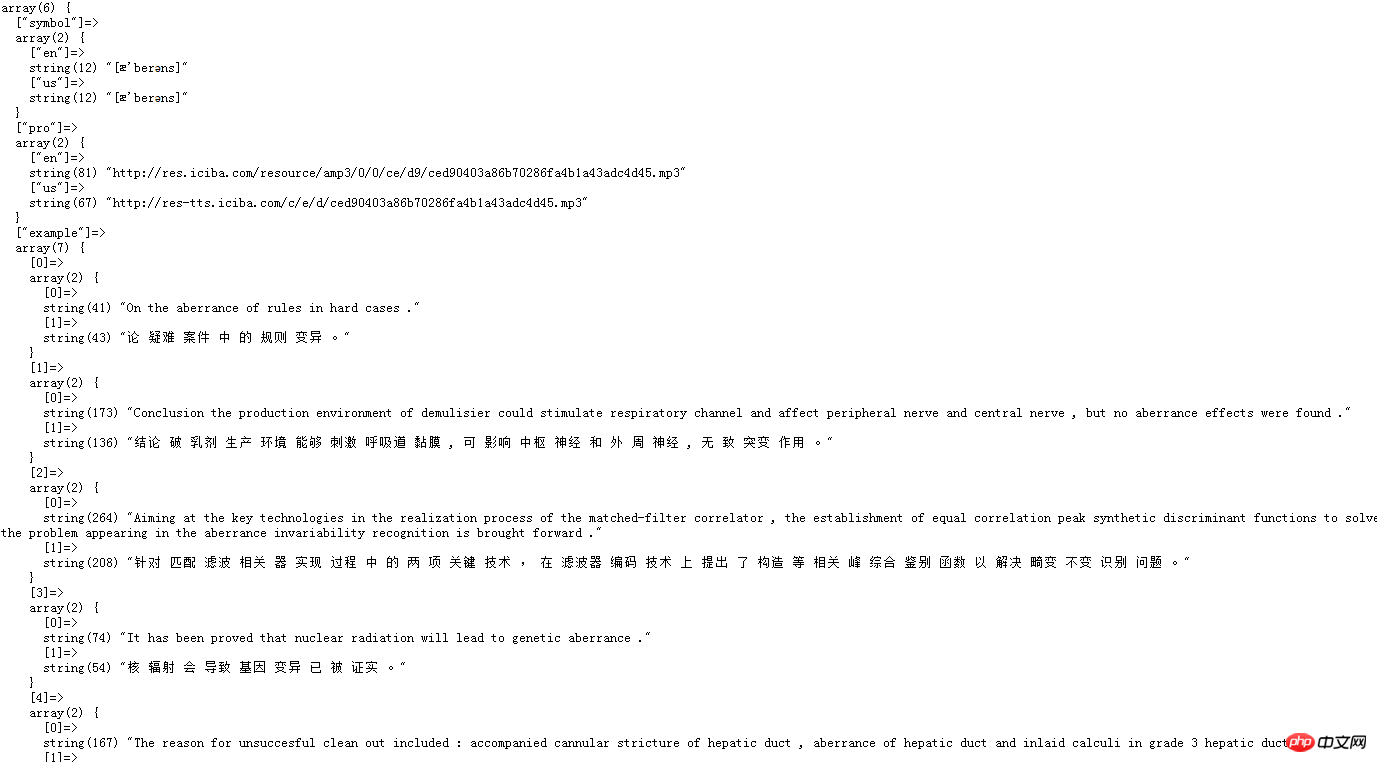Home >Backend Development >PHP Tutorial >PHP query dictionary creation example sharing
PHP query dictionary creation example sharing
- *文Original
- 2017-12-25 14:00:072085browse
This article mainly introduces the relevant information on making Baidu dictionary word search collector with PHP. I hope it will be helpful to everyone.

Baidu dict collection sample
is written to collect all result data after translation from Baidu dict dictionary. Of course, it comes with a 13.5w word library and simple collection cases. , here I release the main class dict.class.php I wrote. The project address is http://github.com/widuu/baidu_dict. If you need it, you can just fork it. There are many people who use this thing. Few, so the useful brother took it~
<?php
/**
* dict.class.php 采集百度词典翻译内容
*
* @copyright (C) 2014 widuu
* @license http://www.widuu.com
* @lastmodify 2014-2-15
*/
header("content-type:text/html;charset=utf8");
class Dict{
private $word;
//显示的条数
private static $num = 10;
public function __construct(){}
/**
* 公用返回百度采集数据的方法
* @param string 英文单词
* retun array(
* symbol" => 音标
* "pro" => 发音
* "example"=> 例句
* "explain"=> 简明释义
* "synonym"=> 同反义词
* "phrase" => 短语数组
* )
*
*/
public function content($word){
$this -> word = $word;
$symbol = $this -> Pronounced();
$pro = $this->getSay();
$example = $this -> getExample();
$explain = $this -> getExplain();
$synonym = $this -> getSynonym();
$phrase = $this -> getPhrase();
$result = array(
"symbol" => $symbol, //音标
"pro" => $pro, //发音
"example"=> $example, //例句
"explain"=> $explain, //简明释义
"synonym"=> $synonym, //同反义词
"phrase" => $phrase //短语数组
);
return $result;
}
/**
* 远程获取百度翻译内容
* get function curl
* retun string
*
*/
private function getContent(){
$useragent = "Mozilla/5.0 (Windows NT 6.1; WOW64; rv:23.0) Gecko/20100101 Firefox/23.0";
$ch = curl_init();
$url = "http://dict.baidu.com/s?wd=".$this->word;
curl_setopt($ch, CURLOPT_URL, $url);
curl_setopt($ch, CURLOPT_USERAGENT,$useragent);
curl_setopt($ch, CURLOPT_RETURNTRANSFER, TRUE);
curl_setopt($ch, CURLOPT_FOLLOWLOCATION, 1);
curl_setopt($ch, CURLOPT_HTTPGET, 1);
curl_setopt($ch, CURLOPT_AUTOREFERER,1);
curl_setopt($ch, CURLOPT_HEADER, 0);
curl_setopt($ch, CURLOPT_TIMEOUT, 30);
$result = curl_exec($ch);
if (curl_errno($curl)) {
echo 'Errno'.curl_error($curl);
}
curl_close($ch);
return $result;
}
/**
* 获取百度翻译发音
* retun array(英,美)
*
*/
private function Pronounced(){
$data = $this -> getContent();
preg_match_all("/\"EN\-US\"\>(.*)\<\/b\>/Ui",$data,$pronounced);
return array(
'en' => $pronounced[1][0],
'us' => $pronounced[1][1]
);
}
/**
* 获取百度翻译发音
* return array(英,美)
*
*/
private function getSay(){
$data = $this -> getContent();
preg_match_all("/url=\"(.*)\"/Ui",$data,$pronounced);
return array(
'en' => $pronounced[1][0],
'us' => $pronounced[1][1]
);
}
/**
* 获取百度翻译例句
* return array() 多维数组 例句
*
*/
private function getExample(){
$str = "";
$data = $this -> getContent();
preg_match_all("/var example_data = (.*)\]\;/Us",$data,$example);
$data1 = "[[[".ltrim($example[1][0],"[");
$data2 = explode("[[[",$data1);
$num = count(array_filter($data2));
foreach($data2 as $key => $value){
$data3 = explode("[[","[[".$value);
foreach ($data3 as $k => $v) {
preg_match_all("/\[\"(.*)\",/Us","[".$v, $match);
if(!empty($match[1])){
$str .= implode($match[1]," ")."@";
}
}
}
$data4 = trim($str,"@");
$data5 = explode("@", $data4);
$result = array_chunk($data5, 2);
return $result;
}
/**
* 获取简明释义
* return array (x => "词性",b => "附属")
*
**/
private function getExplain(){
$data = $this -> getContent();
preg_match_all("/id\=\"en\-simple\-means\"\>(.*)\<p(\s+)class\=\"source\"\>/Us",$data,$explain);
$r_data = $explain[1][0];
preg_match_all("/\<p\>\<strong\>(?P<adj>.*)\<\/strong\>\<span\>(?P<name>.*)\<\/span\>\<\/p\>/Us", $r_data, $a_data);
preg_match_all("/\<span\>(?P<tag>[^\>]+)\:\<a(\s+)href\=\"(.*)\"\>(?P<word>.*)\<\/a\>\<\/span\>/Us", $r_data, $b_data);
$result = array();
foreach ($a_data["adj"] as $key => $value) {
$result[$value] = $a_data["name"][$key];
}
$word_b = array();
foreach ($b_data["tag"] as $key => $value) {
$word_b[$value] = strip_tags($b_data["word"][$key]);
}
$result_data = array("x" => $result,"b" => $word_b);
return $result_data;
}
/**
* 获取同义词
* return array(0 => "同义词", 1 => "反义词") 一般为多维数组
*
*/
private function getSynonym(){
$data = $this -> getContent();
preg_match_all("/id=\"en\-syn\-ant\"\>(.*)<p(\s+)class\=\"source\">/Us",$data,$synonym);
$content = $synonym[1][0];
$data1 = explode("</dl>", $content);
$result = array();
$data2 = array();
foreach ($data1 as $key => $value) {
preg_match_all("/\<strong\>(?P<adj>.*)\ \;\<\/strong\>\<\/p\>\<p(\s+)class\=\"syn\-ant\-list\"\>\<ul\>(?<content>.*)\<\/ul\>/Us", $value, $r_data);
$data2[$key]["adj"] = $r_data["adj"];
$data2[$key]["content"] = $r_data["content"];
}
foreach ($data2 as $key => $value) {
foreach ($value["content"] as $k => $v) {
if(!empty($v)){
preg_match_all("/\<li\>\<p\>(?P<title>.*)\<\/p\>(?P<value>.*)\<\/li>/Us", $v, $v_data);
foreach ($v_data['title'] as $m => $d) {
$data = strip_tags(preg_replace("<</a>>"," ", $v_data["value"][$m]));
$result[$key][$value["adj"][$k]][$d] = $data;
}
}
}
}
return $result;
}
/**
* 获取短语词组
* return array (key => value) 一维或者多维数组
*
*/
private function getPhrase(){
$num = self::$num;
$data = $this -> getContent();
preg_match_all("/id=\"en\-phrase\"\>(.*)\<p class\=\"source\"\>/Us",$data,$phrase);
$data = explode("</dd>",$phrase[1][0]);
$data1 = array_slice($data,0,$num);
$result = array();
foreach ($data1 as $key => $value) {
$data2 = explode("</p>", $value);
$n = count($data2);
if($n<=3){
$result[str_replace(" ","",strip_tags($data2[0]))] = strip_tags($data2[1]);
}else{
$data3 = array_slice($data2,0,$n-1);
$data4 = array_slice($data2,0,2);
$res = array_diff($data3,$data4);
$data5 = array_chunk($res,2);
$key_value = trim(str_replace(" ","",strip_tags($data4[0])));
$result[$key_value] = strip_tags($data4[1]);
foreach ($data5 as $key => $value) {
foreach ($value as $k => $v) {
$value[$k] = strip_tags($v);
}
$array = array($result[$key_value],$value);
if (array_key_exists($key_value, $result)){
$result[$key_value] = $array;
}
}
}
}
return $result;
}
/**
* 将数组转换为字符串
*
* @param array $data 数组
* @param bool $isformdata 如果为0,则不使用new_stripslashes处理,可选参数,默认为1
* @return string 返回字符串,如果,data为空,则返回空
*/
private function array2string($data, $isformdata = 1) {
if($data == '') return '';
if($isformdata) $data = $this->new_stripslashes($data);
return addslashes(var_export($data, TRUE));
}
/**
* 返回经stripslashes处理过的字符串或数组
* @param $string 需要处理的字符串或数组
* @return mixed
*/
private function new_stripslashes($string) {
if(!is_array($string)) return stripslashes($string);
foreach($string as $key => $val) $string[$key] = $this->new_stripslashes($val);
return $string;
}
}
// $word = new dict("express");
// $word ->content();##Related recommendations:
Summary of php basic knowledge (necessary for novices)
The difference between php basics and JavaScript operations (collection)
Detailed explanation of php basic control structure examples
The above is the detailed content of PHP query dictionary creation example sharing. For more information, please follow other related articles on the PHP Chinese website!

